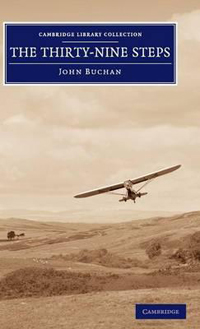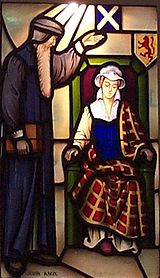
How the Scottish Referendum alters the notion of culture in the European Union.
Ever since his birth in 1908 by illustrator Tom Browne, the Striding Man in the logo of the famous scotch whiskey is the most famous Scotsman in the world. Wearing upper class attire with top hat, red tail coat, white riding trousers and riding boots he has been walking confidently ever since, in broad strides. This emblematic figure is symbolized forward thinking and the pursuit of excellence, two Scottish qualities that the whiskey incorporated in its marketing philosophy. Is he leading the Scots back into the embrace of Westminster or is he leading Scotland away from the Union, like some sort of modern-day Moses?
Scotland is the most visible link in a chain of European large provinces, defined within the European Union as "regions." Despite the fact that they are part of larger European sovereign countries, these regions possess very strong local cultural, linguistic, or religious identities. These distinctive characteristics make these regions skeptical about their links with the mother country. Oddly enough, in most cases regions happen to be wealthier than the country with which they feel trapped into a loveless marriage: industrial Catalonia versus the less wealthy Spain; the wealthier Flanders opposed to its Walloon poorer relatives in a fragile union that forms Belgium; the up-and-coming rebellious Island of Corsica voicing its discontent against French President Francois Hollande with loud bangs of bomb explosions; and finally that strange region of Thrace, a Muslim enclave in Northern Greece which, in a low-key manner, moves toward asserting itself and imposing the rights of its religious community. This is achieved by the rapid increase of its population.
All of these regions are also characterized as political backwater, meaning that their political clout does not play a leading role in the policy of the wider sovereign state to which they belong and initiatives are mostly reduced to the administration of local politics. In order to further reduce the influence of a region, historically the sovereign state markets an even greater distance between the region and itself. This results in the image of a remote land populated by people with particular behavior and a very idiosyncratic culture which the state incorporates in its own cultural framework. Salvador Dali and Juan Miro and architect Gaudi were Catalans yet Spain embraced them as its standard official artists of a multicultural Spanish culture.
In order to further reduce the influence of a region, historically the sovereign state markets an even greater distance between the region and itself. This results in the image of a remote land populated by people with particular behavior and a very idiosyncratic culture which the state incorporates in its own cultural framework. Salvador Dali and Juan Miro and architect Gaudi were Catalans yet Spain embraced them as its standard official artists of a multicultural Spanish culture.
Traditionally Scotland received such a treatment. This sense of a "far-away land" was brilliantly portrayed by writers such as John Buchan who in his Thirty-nine Steps describes:
"In front was a flat space of maybe a mile, all pitted with bog holes and rough with tussocks, and then beyond it the road fell steeply down to another glen to a plain whose blue dimness melted into the distance. To the left and right were round shouldered green hills as smooth as pancakes.I was on the central boss of a huge upland country, and could see everything moving for miles. In the meadows below the road a cottage smoked, but it was the only sign of human life.Otherwise there was only the calling of plovers and the tinkling of little streams."
About fifteen years ago on my way to Edinburgh, I was driving along a similar solitary landscape. Instead of taking the motorway I had selected the scenic back road. The road was freshly coated with Tarmac and the pitch was so immaculately laid that the wheels glided smoothly along. Reaching a remote hilltop I parked the car on the side to enjoy the view. A prominent road sign caught my attention. It informed passersby with big letters that the road had been repaired with funds of the European Union. In the middle of nowhere the EEC made its presence felt.
Scots were always aware of the benefits that the EE showered in all the regions of the European "periphery." The successive local administrations have been very instrumental in exploiting such geographically targeted financial programs. As a result, Scots are very pro-European. Where they draw the line is that they are very nationalistic, the word anathema to European legislators. But their culture has been recognized and respected throughout Europe. At the mention of the word "Scotland" criss-crossed horizontal and vertical bands of various colors come to mind. Woven in various kinds of material, these bands create a motif. The motif in turn spreads into a pattern as it appears on woolen skirts, cotton berets, blazers, curtains, rugs. This is the "tartan," the most prevailing Scottish emblem. Identifying its place of origin, Scotland, the tartan has an impressive array of ambassadors ranging from the Duke of Edinburgh strolling on the hills of his Balmoral Scottish estate wearing a kilt, to Sean Connery, to Mel Gibson as Scottish hero Braveheart, to fashion designer Vivienne Westwood, who turned her fashion show into a political rally by having her models carry YES on the catwalk. So recognizable is this emblem that In fact you can take the tartan out of Scotland but you cannot take Scotland out of the tartan.
At the mention of the word "Scotland" criss-crossed horizontal and vertical bands of various colors come to mind. Woven in various kinds of material, these bands create a motif. The motif in turn spreads into a pattern as it appears on woolen skirts, cotton berets, blazers, curtains, rugs. This is the "tartan," the most prevailing Scottish emblem. Identifying its place of origin, Scotland, the tartan has an impressive array of ambassadors ranging from the Duke of Edinburgh strolling on the hills of his Balmoral Scottish estate wearing a kilt, to Sean Connery, to Mel Gibson as Scottish hero Braveheart, to fashion designer Vivienne Westwood, who turned her fashion show into a political rally by having her models carry YES on the catwalk. So recognizable is this emblem that In fact you can take the tartan out of Scotland but you cannot take Scotland out of the tartan.
Add to these trappings a tartan blanket across a man's shoulder, give him a rifle in hand and you have a member of the Scottish highland regiments that was a key factor for Wellington's victory over Napoleon at the battle of Waterloo. Add the sounds of bagpipes as background music, and you have the Scottish regiments that led for over two centuries military parades across an Empire so vast that "the sun could never set on it," as Scottish writer John Wilson referred to the expansion of the British Empire across the globe.
Scotland joined in the creation of a commercial world empire at the center of which were the British Isles. Britain not only dominated this empire economically, politically and militarily but also emotionally by creating and exporting an imperial identity also known as "Britishness." Britishness became a collective experience reminding nations of the dominant role of Great Britain in the world. The British way of life became the adopted lifestyle of the elites around the world, who sent their children to British schools, observed the ritual of high tea and attended cricket matches that in some distant shore would evolve into baseball. Scottish culture was central to this trend. Scotch whiskey became the drink which separated the boys from the men and the prevailing British spirit worldwide.  The symbolism of the sturdy crystal glass with the weighted bottom designed to hold this spirit alluded to the power of the land from where the drink originated. Scotland also revolutionized our lives against the elements of nature when in 1823 a chemist from Glasgow, Charles Macintosh, treated a cotton fabric spreading rubber on it and came up with the first waterproof coat. The Mackintosh Raincoat crossed over from necessity to fashion and still is considered the sartorial symbol of Britishness.
The symbolism of the sturdy crystal glass with the weighted bottom designed to hold this spirit alluded to the power of the land from where the drink originated. Scotland also revolutionized our lives against the elements of nature when in 1823 a chemist from Glasgow, Charles Macintosh, treated a cotton fabric spreading rubber on it and came up with the first waterproof coat. The Mackintosh Raincoat crossed over from necessity to fashion and still is considered the sartorial symbol of Britishness.
With all these elements of Scottish culture predominating in the culture of the British Isles, why should Scotland wish to break away from a bond?
The deepest causes of the the referendum cannot be tracked in glossy magazines or in literary pages, nor in the breezy moorlands, nor within the walls of a haunted castle. They lie hidden under the earth, literally below the ocean floor. The main reason for the Scottish referendum is a three-letter word: oil!
Ninety-one percent of the estimated 24 billion barrels that are presumed to lie in waiting beneath the waves of the North Sea also lie in Scottish territorial waters. With the new technological advances of offshore drilling and fracking, deep water drilling in remote locations has become a much more realistic prospect. An independent Scotland would force all oil-related companies to move to the cities of Scotland, generating a boost in the economy and real estate. All these arguments can be easily dismissed by the "No" movement with more moderate counter arguments. But there is one point where the "Yes" movement finds no opposition: Alex Salmond, the man who wants to lead Scotland on the road to independence, is an oil economist by trade. He knows every turn of the business and asks one simple question: "Why should Scotland share the North Sea oil income when it has the chance to keep it for itself?" It is this simple and basic question along with his deep knowledge of the field that rallies the population around Alex Salmond to such an unprecedented degree. Not since the preacher John Knox have the Scots flocked around a public figure for guidance. Knox's preaching was instrumental in driving Mary Queen of Scots away from her realm and into exile in England where she was executed for refusing to renounce the rights of her son to the throne of England. With her death she paved the way to the throne for her son, who by becoming King James the First united England and Scotland into Great Britain in 1603. In only a few hours we will find out if Salmond's call will be strong enough to reverse this four hundred year long union.
All these arguments can be easily dismissed by the "No" movement with more moderate counter arguments. But there is one point where the "Yes" movement finds no opposition: Alex Salmond, the man who wants to lead Scotland on the road to independence, is an oil economist by trade. He knows every turn of the business and asks one simple question: "Why should Scotland share the North Sea oil income when it has the chance to keep it for itself?" It is this simple and basic question along with his deep knowledge of the field that rallies the population around Alex Salmond to such an unprecedented degree. Not since the preacher John Knox have the Scots flocked around a public figure for guidance. Knox's preaching was instrumental in driving Mary Queen of Scots away from her realm and into exile in England where she was executed for refusing to renounce the rights of her son to the throne of England. With her death she paved the way to the throne for her son, who by becoming King James the First united England and Scotland into Great Britain in 1603. In only a few hours we will find out if Salmond's call will be strong enough to reverse this four hundred year long union.
Regardless of whether the Scottish electorate will vote for the "high road" or the "low road," the too close to call margin of the last few days will make it very hard for England and Scotland to walk once more hand-in-hand into the sunset. "The Bonnie Bonnie Banks of Loch Lomond" will never again be regarded as a distant nostalgic dreamland -- the cultural byproduct of a political backwater area. Other socio-economic factors will be defining the "region." Scotland will most likely become an example to follow by other "regions" contemplating autonomy or even independence. And culture will be used as a weapon to promote economic policy. Under this light, the Scottish Referendum has altered the cultural face of Europe forever.
_______
Radou Michael Moussou has been an elected municipal councillor for the city of Athens. He is currently the president of the Lycabettus society for the preservation of national patrimony in Athens city of Athens.
